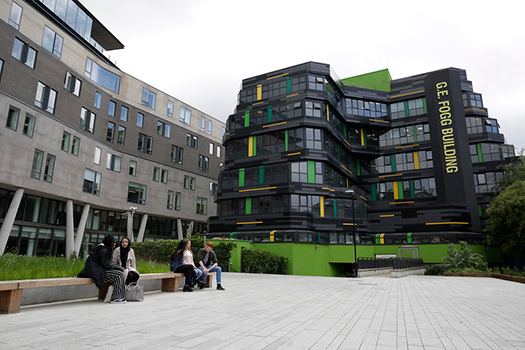Study options
- Starting in
- September 2025
- Location
- Mile End
- Fees
- Home: £12,250
Overseas: £25,500
EU/EEA/Swiss students
What you'll study
Our MSc Psychology: Mental Health Sciences programme places special emphasis on developing key skills in experimental design and statistics as well as advanced hands-on training in many of the specialist methodologies applied to mental health research.
In the first semester, you will be introduced to mental health conditions which typically emerge during childhood and adolescence to understand the underlying developmental pathways and precursors; and you will explore key topics in mental health, from both historical and contemporary contexts, including analyses of current issues in the field. Alongside this, you will develop the skills required to conduct interdisciplinary research in mental health working with experts within the Department of Biological and Experimental Psychology.
In the second semester, you will learn more on each of these perspectives in three methods modules exploring the social, developmental, neuroscientific and genetic aspects of mental health and the complex interplay between these factors. You will get the opportunity to learn advanced methods in mental health including interviews, Electroencephalography (EEG), psychophysiology, behavioural genetics and genomics and cognitive and behavioural neuroscience.
In the third and final semester, you will use what you have learned to develop and conduct an empirical research project. This is an integral part of this programme as it will help you develop the skills required to progress onto further academic or applied research. During the research project you will be supervised by one of our academics.
Structure
- Eight compulsory taught modules
- One research project supervised by one of our academics
Compulsory/Core modules
In this module, students will conduct an in-depth research project focusing on an aspect of psychiatric disorders or psychological wellbeing from a social, cognitive, behavioural, neuroscientific, or genetic perspective. Students will be assigned to a supervisor and start developing a project proposal as part of Semester A module `Academic Skills in Mental Health Sciences I¿ and under the guidance of their supervisor. Students will complete their ethics application, begin designing their experiment and collecting data in semester B. In semester C they are expected to focus solely on the analysis, interpretation, and write-up of the dissertation.
This 15-credit module provides students with advanced-level training in research techniques appropriate for postgraduate research projects. It includes lectures on key research principles and research methodology, as well as practical workshops focused on developing skills in data analysis.
This module investigates the role of social and environmental factors on psychopathology and psychological wellbeing across the life span. Prenatal influences, the immediate social context (i.e., parenting, family structure), the socio-economic context, the wider social context (i.e., neighbourhood quality, green spaces), adverse life events such as exposure to war and displacement, as well as cultural factors, will be covered. This module will also have an applied perspective: reviewing social and environmental interventions that have been developed to address adverse mental health outcomes and promote positive development.
This module will focus on developing the skills required to conduct cognitive and neuroscientific studies of mental illness. A variety of different methods will be covered in-depth, including EEG, fMRI, and psychophysiology. The lectures will cover the theoretical basis of each method and its application to mental health research, and accompanying workshops will teach students how to analyse and interpret neuroimaging data.
This module will focus on the genetic underpinnings of mental health and illness. Students will learn about the variety of genetic approaches that have been developed to understand the genetic risk for psychiatric and neurodevelopmental conditions, such as depression, anxiety, schizophrenia, autism and ADHD. Drawing on the wealth of research studies in this field, we will explore novel clinical applications that integrate genetic information, discuss the way genetic predispositions interface with the environment and are manifested in cognitive and brain phenotypes, and highlight key strengths and limitations and future directions for genetic studies.
This module will focus on developing the key skills required to conduct interdisciplinary research in the mental health sciences. You will learn about the different genetic, social, cognitive, behavioural and neuroscientific approaches to mental health research, how to read and critically evaluate the literature and how to translate clinical findings to basic science questions. A key outcome of this module is to learn how to review the literature and identify a research question focusing on an aspect of psychiatric disorders or psychological wellbeing that can be investigated from a social, cognitive, behavioural, neuroscientific, or genetic perspective.
This module will focus on further developing the key skills required to conduct interdisciplinary research in the mental health sciences. It will provide further support for students during the data collection phase of their projects and semester B modules. It will also provide support in career development to boost students¿ employability on graduation. We will invite speakers from industry, academia and/or the public sector to give careers talks and provide workshops on career planning and job applications, including how to develop a funding application for PhD positions.
This module takes a developmental science approach to understanding mental health conditions. It will introduce common mental health conditions which typically emerge during childhood and adolescence and discuss the underlying developmental pathways and precursors. It will consider, compare, and contrast psychological, social, and (neuro)biological perspectives on child and adolescent mental health. This module will also have an applied perspective, discussing clinical interventions and evaluating their empirical basis.
This module explores key topics in mental health, from both historical and contemporary contexts, including in-depth analyses of current issues in the field. Key themes may include the role of mental health services, the importance of evidence-based practice and evidence-based psychological treatments. This module encourages you to view and reflect on mental health through different lenses and to consider the point the view of practitioners, scientists, and clients. It aims to advance critical reasoning skills through the analysis of empirical research, debates in the literature, and the discussion of the broader contexts of the mental health sciences.
Assessment
- 67% Modules
- 33% Research project
Modules are assessed in a variety of ways, including essays, presentations, exams and project work.
Research project
You will conduct an in-depth research project focusing on an aspect of mental health that can be investigated from a social, neuroscientific or genetic perspective in healthy populations or animal models. The project will begin in the first semester, with the dissertation due at the end of the third semester
Teaching
Queen Mary is home to the research-intensive Department of Biological and Experimental Psychology, whose academics have developed and teach the programme. The department has extensive expertise in the social and biological basis of behaviour with leading researchers in social psychology, genetics and neuroscience and the application of these methods to understanding psychiatric disorders.
Learning will take place through a mixture of lectures, research seminars, workshops, lab practicals, and 1:1 meetings. To help you along your journey, you'll also be assigned an Academic Adviser who will guide and support you in both academic and pastoral matters throughout your course.
Where you'll learn
Facilities
At Queen Mary you will have access to excellent on-campus resources to aid your studies and state-of-the-art research facilities, including:
- An Electroencephalography (EEG) lab, a purpose-built facility designed for the use of researchers exploring cortical brain potentials and cognition.
- The Behavioural Lab, where computer-based experiments are run using psychological software tools such as E-Prime 2.0 and Psychtoolbox for Matlab.
- Newly refurbished lecture theatres
- Modern computer labs
- Three libraries across the four London campuses. The largest is located at Mile End, where you’ll be based the majority of the time, and is open 24/7 during the academic year.
- Access to the University of London’s central facilities – including the iconic Senate House library in Bloomsbury, which contains over 2 million books.
Campus
You will be studying at the School of Biological and Behavioural Sciences (SBBS) on the Mile End Campus, East London. The central location offers easy transport links to all areas of the capital, and you have the opportunity to take advantage of all the capital has to offer, including access to our partner libraries across the city. You will benefit from the wealth of world-leading psychology research taking place in London, including the following:
- Queen Mary Psychology seminar series
- UCL Departmental Lecture Series for Clinical, Educational & Health Psychology
- Kings College London Institute of Psychiatry, Psychology & Neuroscience
- Goldsmiths Department of psychology

About the School
School of Biological and Behavioural Sciences
The School of Biological and Behavioural Sciences is one of the UK’s leading research departments, with a multi-disciplinary approach to teaching and research. We are a large and dynamic school with strong links with industry, offering students a stimulating and supportive learning experience.
Queen Mary University is also part of the Russell Group - a body of leading UK universities dedicated to research and teaching excellence.
We also collaborate with the School of Geography on the Centre for the Aquatic Terrestrial Environment (CATE). The facilities of which, some students can access for specific projects or modules.
Career paths
The advanced, interdisciplinary training in the science of mental health and research methods means that graduates are very well prepared for a career as a research psychologist (via a PhD). The learned skills and knowledge can also be applied to careers in social work, coaching, or education with employers such as the NHS and private healthcare providers.
Graduates are also well-placed to progress onto training to become a Clinical Psychologist, Counsellor or Psychotherapist. Indeed, strong competition for places means that postgraduate training is likely to become a requirement for these programmes.
93% of our postgraduate taught students are in employment or further study within six months of graduating. 100% of those in work are in highly skilled employment and 100% are earning over the median salary - Their average UK salary 15 months after graduating is £29,500 – That’s over £6,000 higher than the national average (HESA GOS, 2017/18.)
- 93% of our postgraduate taught students are in employment or further study within six months of graduating (HESA GOS, 2017).
- 100% of those in work are in highly skilled employment and earning over the median salary (HESA GOS, 2017/18).
- £29,500 The average UK salary 15 months after graduating for our postgraduates (HESA GOS, 2017/18).
Fees and funding
Full-time study
September 2025 | 1 year
- Home: £12,250
- Overseas: £25,500
EU/EEA/Swiss students
Conditional deposit
Home: Not applicable
Overseas: £2000
Information about deposits
Queen Mary alumni can get a £1000, 10% or 20% discount on their fees depending on the programme of study. Find out more about the Alumni Loyalty Award
Funding
There are a number of ways you can fund your postgraduate degree.
- Scholarships and bursaries
- Postgraduate loans (UK students)
- Country-specific scholarships for international students
Our Advice and Counselling service offers specialist support on financial issues, which you can access as soon as you apply for a place at Queen Mary. Before you apply, you can access our funding guides and advice on managing your money:
Entry requirements
UK
Degree requirements
A 2:1 or above at undergraduate level in Psychology with suitable content will be considered. Degrees in Medical, Health, and Biological Sciences or other fields related to Psychology will be considered on an individual basis.
Other routes
Applicants with a good 2:2 degree (55% or above) will be considered on an individual basis.
Find out more about how to apply for our postgraduate taught courses.
International
English language requirements
The English language requirements for our programmes are normally indicated by an English band assigned to the academic department within which your chosen course of study is administered. However, this course does not follow the School of Biological and Behavioural Sciences standard English language requirements for entry to postgraduate taught and research programmes.
For the English language requirements for this course, see programmes with non-standard English language requirements in this School.
Visas and immigration
Find out how to apply for a student visa.


.png)



.jpg)

